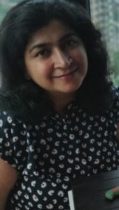Maẕhab nahīṉ sikhātā

The year was 1984. I was seven.
We still hadn’t moved to Delhi. It was a small town in Haryana, we lived in, where kids were sent to buy groceries from nearby nukkad markets. I remember coming home one day and telling my mum that the usual shopkeeper wasn’t there. My mum nodded absentmindedly.
I kept looking out for him, but that shopkeeper never came back. The friendly, smiling turbaned fellow was now replaced by a sombre clean-shaven, short haired man. I would stare at him closely hunting for similarities; rudeness wasn’t a thing we worried about back then.
We moved on; I grew up. I would often think about that shopkeeper. I knew by then that for Sikhs their hair is sacrosanct. What must have crossed his mind when he would have agreed to shear them off? I couldn’t even imagine.
In 1990, when the road show called rath yatra piqued our nation’s interest, I couldn’t comprehend what the brouhaha was all about. I remember it was a Sunday when it passed the road in front of our house. The movie, Pushpak, was being aired. I thought they were foolish who chose to wait for hours to gawk at an overhyped tableau than spend the time watching a well-made movie.
By 1993, I was grown up just enough to understand the horror but not the extent of it. By 2002, I was wiser. All these events affected me deeply but none of it could shake my belief in humanity and the basic tenet of religious tolerance. If at all, it just reinforced my belief system. For me, Iqbal’s line will always ring true- Maẕhab nahīṉ sikhātā āpas meṉ bair rakhnā.
Its 2020 now and yet again my beliefs are tested. I am not sleeping too well because I am terrified and shocked. I thought I had seen it all and had hoped that my country must have learnt its lessons well. But apparently that will take a while.
In the meantime, I turn to hug my daughter and nephew for solace. My solace. I may not be able to undo the wrongs but I can ensure that my children do not inherit the hate that’s making rounds. I discuss in front of them so they can make their choices when they grow up. And I want them to know that for all that is going wrong in our society today, there are enough who are trying to do the right things- by reaching out, by writing or by raising their voices. They are in my prayers.
I never had much faith in the political system. It is a nation’s collective conscience that plays the most important role in steering it out of trouble like this. The common man is doing its bit. I just hope that the media houses and journalists too rise up to the challenge and heed to this conscience. Sensationalising violence, selectivity in projecting news or being the mouth speak of the chosen few may get them short term benefits. They know the power that they wield but I want to remind them of the responsibility that it entails.
